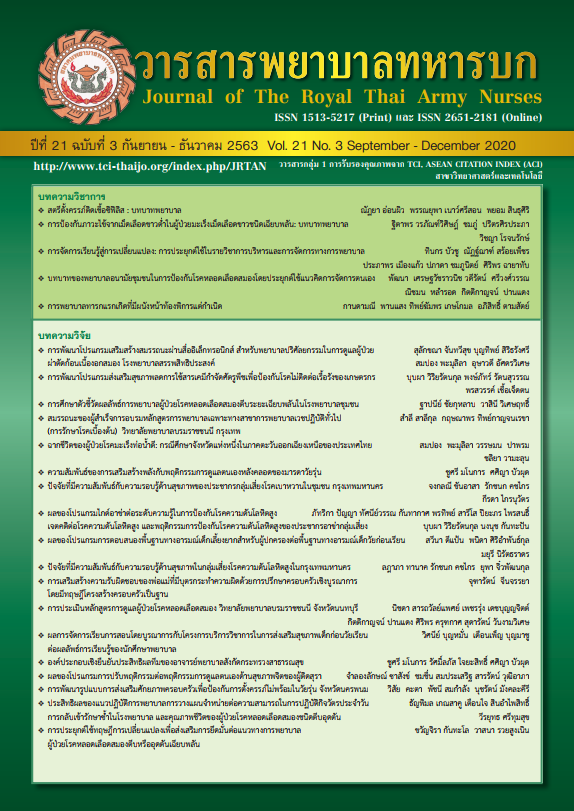The Effects of Self- Regulation Program on Sugar Consumption Behavior and Glycemic Level for Pregnant Women with Gestational Diabetes Mellitus Women in Community in Samut Sakhon Province
Keywords:
Gestational Diabetes Mellitus, Sugar consumption, Self-regulation program, Glycemic controlAbstract
This quasi-experimental study, two group pretest-posttest design, aimed at study the effects of self-regulation program on sugar consumption behavior and glycemic control level among gestational diabetes mellitus women. The samples were purposive sampling and divided into experimental group (n = 33) and comparison group (n = 32). The experimental group received 8-weeks self-regulation intervention program those consisted 3 stages: 1) self-monitoring 2) self-evaluation and 3) self-reaction. The research instrument composed of 3 set of questionnaires; data based, attitude of sugar- beverage consumption, and food-beverage sugar consumption behaviors. Those were analyzed using descriptive statistics and t-test for mean score comparison.
The results of study revealed that after joining the program, experimental group had higher mean score of sugar consumption attitude and behaviors, and lower mean score of blood sugar level statistically significant (p-value<.05). While posttest comparison between group, the experimental group showed lower mean score of blood sugar level than the comparison group statistically significant (p-value<.05). The researcher recommends that this intervention program should be utilized for self-regulation skill enhancement related to sugar consumption behaviors, in order to reducing harmfulness in both mothers and their child.
Downloads
References
International Diabetes Federation. IDF Diabetes Atlas 7th Edition; 2017.
World Health Organization. World Diabetes Day 2017 supports women’s rights to a healthy Future.2017.
Rattanarungsima K. The sugar consumption of Thai population during 1997- 2110. Thailand Journal of Dental Public Health.2012;17(2): 23-30.(in Thai)
World Health Organization. Population intake goals for preventing diet related diseases. In diet nutrition and the prevention of chronic diseases report of a joint WHO/FAO expert consultation. WHO Technical Report Series No 916;2020.
Global Agricultural Information Network. Foreign agricultural service, department of agriculture. 2014.
Kim S Y, Sharma A J, Sappenfield W, Wilson H G, Sahhu H M. Association of maternal body mass index, excessive weight gain and gestational diabetes mellitus. Obstetrics and Gynecology.2014;123:737-44.
Lim W Y, Kwek K, Chong Y S, Lee Y S, Yap F, Chan Y H, Pan A. Maternal adiposity and blood pressure in pregnancy: varying relations by ethnicity and gestational diabetes mellitus. Journal of Hypertension.2014;32:857-84.
Shi P, Yang W, Yu Q, Zhao Q, Li C, Ma C, et al. Overweight, gestational weight gain and elevated fasting plasma glucose and their association with macrosomia in Chinese pregnant women. Maternal and Child Health Journal. 2014;18:10-15.
Tavakolizadeh J, Moghadas M, Ashraf H. Effect of Self-regulation Training on Management of Type 2 Diabetes .Iranian Red Crescent Medical Journal.2014;16(4): e13506
Limruangrong P. A self-regulation program on diet and exercise behaviors in pregnant women with gestational diabetes mellitus. Unpublished doctoral Dissertation, Mahidol University. Bangkok,Thailand.2011.(in Thai).
Chuchuen A, Akdevong N, Binhosen V. Effects of self-management enhancing program on health behaviors and blood sugar in women with gestational diabetes mellitus. Journal of Nursing and Health Care. 2016;32(4):60-7. (in Thai)
Kanfer R, Kanfer F H. Goals and self-regulation: Applications of theory to work settings. Advances in Motivation and Achievement; 1991.
Cohen, J. Statistical power analysis for the behavioral sciences. 2nd edition. Hillsdale, NJ: Lawrence Erlbaum Associates;1988.
Kulsuwiponchai W, Iamsupasit S, Taneepanichsku S, Suttiwan P. Development and validation of the sugar-sweetened beverage knowledge questionnaire (SSBKQ) for undergraduate students. World Journal of Nutrition and Health. 2019;7(1):6-10.
Sanguanprasit B, Leerapan P, Taechaboonsermsak P, Chongsuwat R. Village health volunteers as peer supports for glycemic control among type 2 diabetes patients in Thailand. Journal of Public Health and Development. 2016;14(2):49-60.(in Thai).
Berry D, Johnson Q, Stuebe A. Monitoring and managing mothers with gestational diabetes mellitus. Dove Press.2015;(5):91-7.
Ichikawa K, Fujiwara T, Nakayama T. . Effectiveness of home visits in pregnancy as a public health measure to improve birth outcomes. Plos One.2016;11(3): e0152354.
Sandall J, Devane D, Solth H, Gates S, Shennan A., Deveane D. Midwife-led continuity models versus other models of care for childbearing women. Cochrane Database of Systematic Review.2016; 9 : doi:10.1002/14651858.CD004667.pub5/full.
Dahlberg U, Aune I. The women’s birth experiencethe effect of interpersonal relationships and continuityofcare.Midwifery.2013;29(4):407-415. 20. Bloch J R, Zupan S, McKeever A E, Barkin J L. Perinatal nurse home visiting referral patterns among women with diabetes and hypertension in Philadelphia. Journal of Obstetric Gynecologic & Neonatal Nursing. 2017;46(1): 29–39.
Tongpeth J. Effectiveness of self - management promoting potential program on blood sugar control and quality of life among diabetes mellitus type 2 patients. Journal of The Royal Thai Army Nurses.2013;14(2):69-78. (in Thai)
Luorkuntod S, Koksongnoen N. Effects of self–management support on health behavior, blood sugar level, blood pressure level blood lipid level, and glomerular filtration rate among people with chronic kidney disease stage 3. Journal of Health Research and Development Nakhonratchasima Public Health Provincial Office. 2015;1(1):29-39. (in Thai)
Suksriin M. The outcomes of health promotion program of women with gestational diabetesmellitus. Christian University of Thailand Journal. 2013;20(1):92-104.(in Thai)
Yaisoon S, Cheewapat P, Budsaengdee B. Developing self-regulation model of pre- service skills training in practicuum in family nursing and midwifery I course of nursing students in srisavarindhira thai red cross institute of nursing. Journal of The Royal Thai Army nurses 2019;20(3):133-143. (in Thai)
Preeraphruethipong N, Pakdevong N, Namvongprom A. Effects of self-management program on knowledge, self–care activities, and hba1c in persons with type 2 diabetes mellitus. Journal of Nurses’ Association of Thailand, North-Easte Division.2012;30(2): 98-105. (in Thai)
Downloads
Published
How to Cite
Issue
Section
License
บทความหรือข้อคิดเห็นใดใดที่ปรากฏในวารสารพยาบาลทหารบกเป็นวรรณกรรมของผู้เขียน ซึ่งบรรณาธิการหรือสมาคมพยาบาลทหารบก ไม่จำเป็นต้องเห็นด้วย
บทความที่ได้รับการตีพิมพ์เป็นลิขสิทธิ์ของวารสารพยาบาลทหารบก
The ideas and opinions expressed in the Journal of The Royal Thai Army Nurses are those of the authors and not necessarily those
of the editor or Royal Thai Army Nurses Association.






